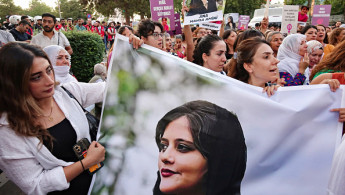On Mahsa Amini anniversary, Iranian president says Morality Police will not 'bother' women over headscarf
Iran's morality police will no longer "bother" women over the wearing of the mandatory headscarf, the country's reformist new president announced on Monday.
Masoud Pezeshkian, who was holding his first press conference since taking office in July, made the comments in response to a question about the headscarf by a female reporter.
"The morality police were not supposed to confront [women]. I will follow up so they don’t bother [them]," the Iranian president said.
Pezeshkian's comments coincide with the second anniversary of the death of Mahsa Amini, who died in the custody of the morality police over allegedly not wearing the hijab to the standards of Iran’s dress laws.
The 22-year-old's death led to nationwide protests against the hijab laws that quickly became protests against the Iranian regime in general, with slogans being chanted calling for the fall of Supreme Leader Ayatollah Khamenei.
The regime cracked down on the protests brutally, with over 500 people killed and at least 22,000 arrested.
President Pezeshkian ran on a ticket of easing the repressive dress law for women and early signs were promising, with reports of a rise of women walking openly in Iranian cities without the mandatory headscarf.
However, on Monday, the BBC reported that the social media accounts of Iranian women were being spied on by the regime, leading to beatings, threats and arrests.
The report details the case of several Iranian women who posted pictures of themselves without the hijab and participated in protests against the forced wearing of the garment.
In one case, a young woman was arrested after authorities found her private social media posts. She was interrogated for hours, accused of working for the US and then found guilty of “promoting corruption and fornication”, after which she was brutally lashed fifty times with a whip.
Other women were taken to the country’s notorious Evin prison, where they were crammed into tiny, unsanitary cells and subject to torture during interrogations.
On Friday, the UN experts accused Iran of "intensifying" its repression of women two years after Mahsa Amini died in custody.
The UN Human Rights Council appointed the experts to investigate the deadly crackdown on nationwide protests that rocked Iran after Amini's death.
"Although mass protests have subsided, the unabated defiance of women and girls is a continuous reminder that they still live in a system that relegates them to 'second class citizens'," said the experts.




 Follow the Middle East's top stories in English at The New Arab on Google News
Follow the Middle East's top stories in English at The New Arab on Google News


